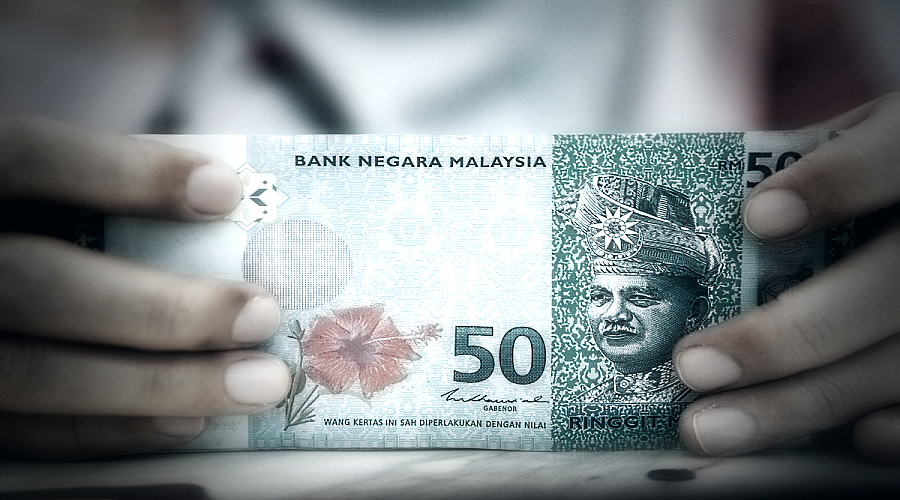The ringgit exchange rates against major currencies have been trending downward since March 2015.
On Monday, the ringgit closed at 4.7750 to the greenback, and 3.55 to Singapore dollar.
If Bank Negara is unable to arrest the decline, the local unit could fall below the 4.8850 psychological level recorded during the 1997 Asian financial crisis, sending tremendous jitters across companies and members of the public, and the subsequent panic selling of ringgit in favor of the US dollar or Singapore dollar.
What have caused the unchecked devaluation of ringgit, and how to stabilize the money market?
Firstly, balance of payments. Malaysia, a trade-surplus nation, by right should see its currency in good demand, hence an appreciating (or at least stabilizing) trend. However, the speculative nature of short-term capital flow in the capital account could also impact the stability of a currency.
Secondly, inflation. Inflation is a consequence of oversupply of currency owing to excessive money printing, sending the currency’s exchange rates lower and goods prices skyrocketing.
At the same time, the increased cost of exports will erode a country’s competitiveness in international markets.
Nevertheless, the authorities said due to the absence of a severe inflation, there shouldn’t be massive capital outflow that could affect the market’s outlook for the currency’s trend.
Thirdly, interest rates. Interest rate levels will have a direct bearing on international short-term capital flow.
Over the past one year, the Fed has within a span of several months spiked the funds rate from 0.25% to a high of 5.25%, prompting central banks worldwide to follow suit and sending Malaysian funds fleeing. The Malaysian government has not adjusted its interest rate proportionately in a bid to stabilize goods prices.
Fourthly, political factors. Political instability is a key factor impacting a currency’s exchange rate. Political, along with economic factors provide cues to international currency speculators.
Although there was no proof of massive speculative transactions in the local money market, and the government was striving to increase the people’s incomes, lower the unemployment rate and lure foreign investments in a bid to regain public confidence, such efforts appeared to have been futile in stabilizing the ringgit exchange rates.
Fifthly, government intervention. So far all the government has done is mere pep talks, while Bank Negara has said in a statement to lift public confidence. But, this doesn’t seem to work at all.
If the government is to really intervene, it will have to dig into gold or foreign reserves to buy back the ringgit, and lift the currency’s value through boosting its demand.
Given the country’s relatively weak gold and foreign reserves position, we simply do not have adequate spare cash to infinitely intervene in the money market.
Sixthly, external factors. Economist Andrew Sheng recently told Sin Chew Daily ringgit’s weakness had something to do with the lackluster economic performance of the country’s major trading partner, China.

Additionally, global economic slowdown has also impacted Malaysia’s export trade, suppressing the demand, and hence value, of the ringgit.
Sheng also said this was not because the ringgit was intrinsically weak, but the US dollar was too powerful, citing the example of even poorer showing of the Japanese yen these past two years.
We “partly” agree to this. In addition to external factors beyond our control, political turmoil, the US fed funds rate, and inadequate foreign reserves for effective market intervention are all reasons for a weakening ringgit.
Bank Negara Governor Datuk Shaik Abdul Rasheed Abdul Ghaffour said the country’s domestic demands remained strong while external demands were improving, and therefore the ringgit’s current trend had not realistically reflect the country’s positive future economic outlook.
He pointed out in a statement that ringgit’s “recent weakness” was largely similar to that of other regional currencies — all affected by external factors such as US interest rates, geopolitical concerns and uncertainty in China’s economic outlook.
This was the third time Abdul Rasheed gave a “pep talk” to shore up market confidence since he took office almost half a year ago. But, he offered no solutions to address this problem.
Apurva Sanghi, the World Bank Lead Economist for Malaysia, said the ringgit’s recent decline to 4.8 against the dollar is a symptom of the fall in Malaysia’s competitiveness since the Asian financial crisis and the 1MDB shock.
Apurva explained in a social media post that the drastic fall of ringgit and other regional currencies was caused by external factors such as the slowing Chinese economy and recent rate hikes by the Fed, which we do agree.
He said the impact from external factors varies from country to country due to divergent domestic conditions and measures adopted by their governments.
As a matter of fact, other regional currencies such as the new Taiwan dollar, Singapore dollar, Philippine peso, Vietnamese dong, Indonesian rupiah and Thai baht have depreciated less than the ringgit, since the Fed spiked the funds rate. And this could be attributed to the gradual decline in Malaysia’s competitiveness.
Apurva cited the examples of Thai baht and Korean won, two worst-hit currencies during the Asian financial crisis which have performed much better than our ringgit lately because of the monetary reforms implemented after the crisis.
These two countries have opted to endure short-term pains in exchange for long-term benefits.
Unfortunately, Malaysia has not done so!
The Unity Government must do something to tackle the sliding ringgit. This can be done through luring foreign investments, wooing foreign tourists, actively promoting MM2H program, expanding public investments, encouraging sustainable value-added sectors, freeing the country from perpetual political tussles and comprehensive training of talented workforce, among other things.
It is hoped that the King’s inaugural royal address will strike a chord with the many YBs sitting inside Dewan Rakyat.
ADVERTISEMENT
ADVERTISEMENT


































